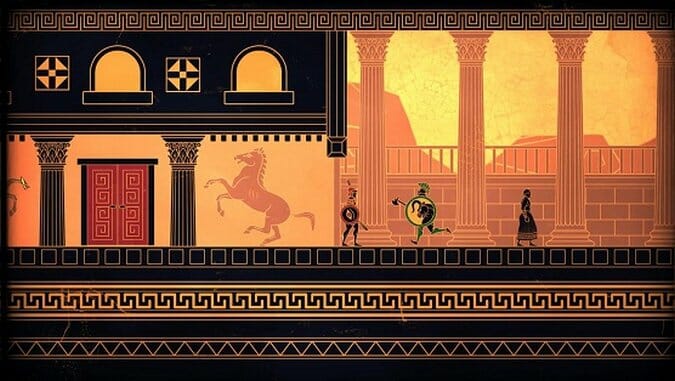Apotheon: A Song of Wonder

Apotheon makes about the worst first impression possible. Stepping into the boots of Nikandreos, a young man with a great destiny, you find your city being besieged by troops. Almost immediately the village elder hands you a chore list: help the blacksmith, fend off some soldiers, save the prisoners and so on. The first thirty minutes of the game has you running around the devastated city of Dion, poking dudes with spears and running into burning buildings. Beyond the introduction to the gorgeous, ancient Greek pottery-inspired aesthetic, it’s a pretty dull and clichéd half hour.
But then something happens: Apotheon abruptly takes flight, revealing its treasures one after another. Hera, seeking to overthrow her husband Zeus for her own purposes while promising salvation for humanity if you help her, sends you skyward to Mount Olympus, presented as a hub world that transports you to each god’s domain. The main line through the game is pretty straightforward: go to a zone (like Hades or The Fields of Demeter), complete some tasks and then confront the god who inhabits the area. Every zone feels like its own distinct little world teeming with life. Hades has lost souls wandering grey shores and deep caverns while hunters and wolves stalk one another on Artemis’ reserve.
These worlds are colorful and filled with NPCs with whom you can interact: storekeepers, drunks, weapon trainers. Perhaps the game’s crowning achievement is that it takes an open world design philosophy, sticks it inside the shell of a Metroid-style game and makes the combination work surprisingly well. You’re allowed to complete each quest’s objectives in whatever order you wish. You can roam around the marketplaces, breaking into homes to steal items, or hunting down valuables in gods’ domains to find or buy armor and weapon upgrades. Now consider for a moment how many games strive to build a universe for you to explore, a place in which you are meant to lose yourself hunting animals to craft armor, excavating tombs for treasure or even taking a break from chasing down an evil sorcerer to pluck some herbs. These games are essentially huge playgrounds, tabula rasa adventures that encourage you to explore at your own pace and create a unique story out of the tools and materials provided. Vast, unfathomable amounts of resources are dedicated to creating the snowy mountains of Skyrim or the desolate Hissing Wastes, and yet, somewhat astonishingly, as small as Apotheon is, it constructs a world that’s just as compelling as any recent blockbuster RPG (if not more so).
Part of that intrigue comes from the pottery aesthetic. Apotheon is just gorgeous to witness in action. Troops march across the screen wielding spears and shields, slinging stones and oil bombs as they pass by stone pillars and gigantic statutes. Clever lighting makes darker areas, places that you have to explore with a torch in hand, legitimately frightening since some weepy soul or a chimera might be lurking just out of the reach of your light. It’s like watching an ancient Grecian’s nightmare in action.
Apotheon certainly has more going for it than its looks though. Combat is initially ho-hum if you stick to charging enemies with a sword or chopping at them with an axe. However, there’s a plethora of alternatives you can use to make encounters with enemies far more engaging: ranged weapons (javelins, bows), bombs, summoning spells, potions and even traps. Once you get used to the somewhat complicated control scheme, it’s pretty easy to pull off some satisfying combos that mix those options, such as striking your enemy away from you with your sword and then shooting the burning oil pot above him with an arrow so flames rain down on his head. Apotheon encourages you to experiment with combat since all weapons degrade and eventually fall apart. While this is initially frustrating, the weapon drops in the game are generous enough that you’ll always have enough tools to get the job done.
The game’s (many) boss fights are well-designed encounters that rarely ask you to just pound away at a life bar with a weapon. They’re all varied and imaginative scenarios that are essentially refreshing minigame segments providing a break from combat and exploration. A strong example, and one of my favorite boss battles in recent memory, is the fight with Artemis. Artemis, the goddess of the hunt, turns you into a fawn and chases you around her forest, shooting arrows while you try to reach several totem poles at different corners of the level. After you’ve tagged the required number of poles, you turn into the hunter and Artemis into the prey. You can chase her with arrows and spears, or lay traps. The fight goes on until someone’s health bar hits zero. It’s an exhilarating, back and forth duel that makes great use of that mythological figure’s attributes. In fact, nearly all of Apotheon uses Greek mythology in clever ways.
